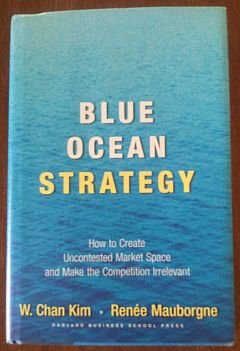Thinking Strategy, Think Blue Ocean
It’s normal this time of the year to be thinking strategy.
Which usually includes addressing a host of questions, the answers to which are not always immediately forthcoming.
Such as:
- How can we improve on last year’s performance?
- Are we on the right track with our business? What is the competition doing?
- If we suddenly start to grow do we have the resources to manage the growth well?
- What changes are there in the business environment that could help us or maybe cramp our style?
Last week I wrote about choosing a word to highlight how we are approaching the year.
It also helps to have a strategic organising principle. And if we have chosen a word for the year, the organising principle will be in harmony with that.
As explained in that earlier post, the word I’ve chosen this year is Exceptional, as in, for example, seeking to attract exceptional clients and committing to providing exceptional service.
 The strategic organising principle I’m using this year is that of the Blue Ocean Strategy. I’ve been kind of using the strategy in the past few years, since I read the book of the name, by W. Chan Kim and Reneé Mauborgne. But applying it, I have to admit, in a somewhat haphazard way.
The strategic organising principle I’m using this year is that of the Blue Ocean Strategy. I’ve been kind of using the strategy in the past few years, since I read the book of the name, by W. Chan Kim and Reneé Mauborgne. But applying it, I have to admit, in a somewhat haphazard way.
This year I want to apply blue ocean thinking in a more focused way.
If you haven’t read the book, I commend it to you. The following two quotes are for me the “entry points” for a helpful reading of the book and understanding the strategic thinking framework the authors present:
“In red oceans, industry boundaries are defined and accepted and the competitive rules of the game are known.”
“Blue oceans…are defined by untapped market space, demand creation and the opportunity for highly profitable growth.”
You can find a blue ocean. For example,
Casella wines, not then a household name in their (and my) native Australia, saw a potential blue ocean in the US, where many people were not drinking wine, thought that was for other people (read “sophisticates”) and were basically being ignored by the US wine industry. Casella asked themselves how they could make “a fun and not traditional wine that’s easy to drink for everyone”. They provided wines with a yellow kangaroo plus a whole marketing campaign etc. They basically redefined how wine could be produced and marketed in the USA. And they broke with convention in a whole lot of ways. And succeeded.
Or you can create a blue ocean.
“Southwest Airlines created a blue ocean by breaking the trade-offs customers had to make between the speed of airplanes and the economy and flexibility of car transport. To achieve this, Southwest offered high-speed transport with frequent and flexible departures at prices attractive to the mass of buyers.” (p 38)
For me a key insight from the book was to see that traditional business strategies and analytic frameworks are about red oceans, not surprisingly really, when you think about it, given they reflect a military mindset, i.e. limited, contested market space, limited resources, limited time. Hence bloody, hence red ocean.
Blue ocean thinking is about value innovation – “Value innovation is the cornerstone of blue ocean success.” (p 12)
“…instead of focusing on beating the competition, you focus on making the competition irrelevant by creating a leap in value for buyers and your company, thereby opening up new and uncontested market space.” (p 12)
Our choice, red ocean or blue
As the Blue Ocean Strategy website (an excellent resource on the subject) says:
“Blue ocean strategy offers you a way to swim out of the red ocean filled with sharks. It presents a theory, tools, and frameworks to allow your company to break away from the competition and create a blue ocean of new market space.”
Is your business in a red ocean or a blue one? The Blue Ocean Strategy website provides a handy list of questions you can ask yourself: see How Blue is Your Ocean?.
Des Walsh
Business coach and digital entrepreneur. With coach training from Coachville.com and its Graduate School of Coaching, and a founding member of the International Association of Coaching, Des has been coaching business owners and entrepreneurs for the past 20 years. Over the same period he has also been actively engaged in promoting the business opportunities of the digital economy. He is a certified Neurolinguistic Programming (NLP) coach, and a certified specialist in social media strategy and affiliate marketing.


2 Comments
Comments are closed.